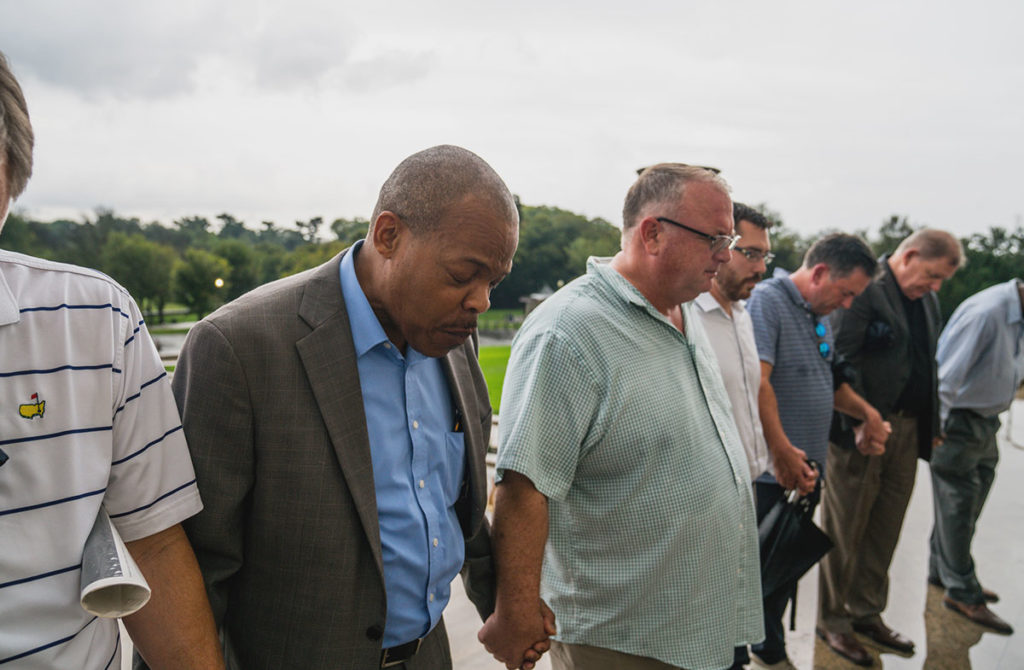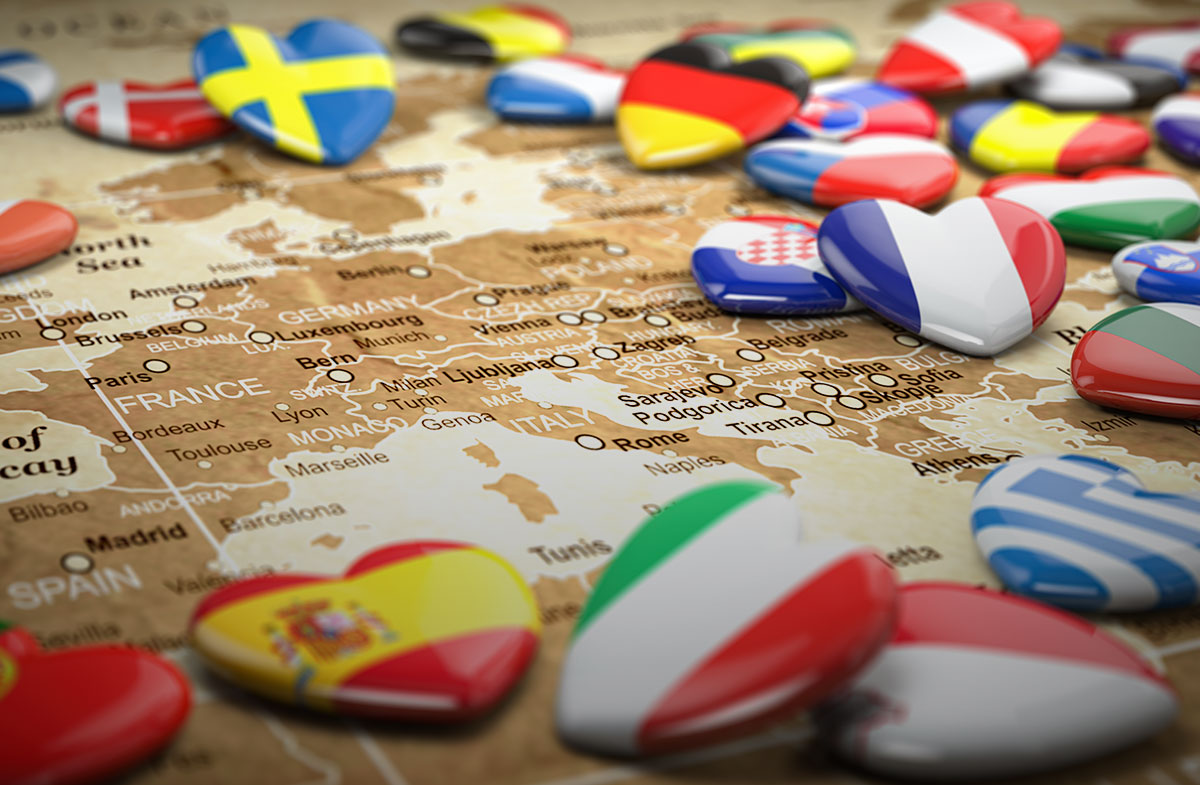Editor's Note
This is an edited excerpt from Jim Memory’s recent Europe 2021: A Missiological Report, which theologian Chris Wright has called ‘essential reading for all those who, in any part of the world, are concerned about mission in, from, and to the continent of Europe.’ Read the full report.
Will European churches wake up to what God is doing across the continent? The future of Europe depends on it.
In many ways, Christianity is what made Europe Europe. No other continent has been exposed to Christianity for such a prolonged period and in such an extensive way. Yet just as Europe was the first continent to be Christianised, it was also the first to be de-Christianised.
90%
of Christians lived in Europe and North America in the 19th century
60%
of Christians lived in Africa, Asia, South America and Pacific in the 20th century
At the beginning of the 19th century, well over 90 percent of Christians lived in Europe and North America, whereas by the end of the 20th century, over 60 percent lived in Africa, Asia, South America, and the Pacific. It was the historian and missiologist Andrew Walls, who died just last month, who was among the first to notice and study this shift in ‘the Christian centre of gravity’.[1]
Many see Europe as thoroughly post-Christian or secular, yet the reality is much more complex than that. And out of the spotlight, an extraordinary re-evangelisation of Europe is taking place.
Three dimensions of this can be identified: diaspora churches, church planting movements and platforms, and the next generation.

Intercultural Christianity: The Future of Europe?
God is using people on the move to re-evangelise the continent of Europe.
The migration of Christians from other locations and the formation of diaspora churches are nothing new in Europe. European diaspora churches are part of European history. Many towns and cities across Europe have substantial European diaspora communities and historic diaspora churches.
However, over the last two generations, migration from the Majority World has seen a significant number of new diaspora churches being planted across Europe, including Spanish-speaking and/or Brazilian congregations, Chinese churches, and Black African churches, which are the most numerous. The Redeemed Christian Church of God alone has over 750 congregations today and continues to plant 25 new churches in Britain every year.[2] And that is just one of many denominations. If there is an African population in a European city, there will almost certainly be an African diaspora church, even if European Christians are not even aware of it.
750
Redeemed Christian Church of God congregations
25
new churches they plant every year
Although the statistics are promising, the presence of diaspora churches in Europe does not automatically lead to the effective re-evangelisation of Europe. As Harvey Kwiyani has observed:
African churches in Europe have so far been very successful only in evangelising fellow Africans. A very small portion of them have made any inroads reaching Europeans. Many say it is too difficult to reach out to Europeans. Many have told me, “It forces us to do things differently, and that is too uncomfortable.” By “doing things differently,” they mean such things as having shorter worship services or having to embrace relational evangelism. For these pastors who at least want or try to engage in mission among Europeans, their presence in Europe makes them believe they have to be missionaries to Europeans. As such, they try to contextualise their ministries for Europeans, experiencing very little success along the way. Most of them lack the training that would enable them to understand what cross-cultural mission to Europeans should look like.[3]
However, not all the responsibility of this failing is down to diaspora church leaders. Many native European churches have either not wanted or not known how to help diaspora Christians to reach the local population.
Throughout the COVID-19 pandemic, however, there have been signs that diaspora and native European church leaders in towns and cities across the continent have been supporting one another. These connections may prove to be an important stimulus to further collaboration going forward.
Furthermore, as second and third generation diaspora Christians come into leadership, they increasingly seek to establish intercultural churches which can more easily reach out to native Europeans.
The future of the church in Europe may well depend on the emergence of a truly European intercultural Christianity.[4]

The Many Faces of European Church-Planting Movements
It is not only Majority World Christians who are planting churches. Church planting generally has accelerated across Europe, in part because of the emergence of national church planting platforms.
For example, the vision of the CNEF[5] (National Council of French Evangelicals) to plant one evangelical church for every 10,000 people has spurred church planting in France. On average over the last few years, one church is planted every seven days or so in France.
Similar platforms have emerged in many European countries, some as a result of processes to facilitate church planting like M4 and Multiplication Network, some as the result of catalytic/apostolic individuals like Relational Mission or the Lausanne Church Planting Network, and some through international networks like City-to-City or Acts29.[6] Either way, the gathering of 170 platform leaders from nearly thirty nations in Berlin in early 2018 indicated the arrival of a new dynamic in Europe: National Church Planting Processes (NC2P).
Denominational church planting initiatives have seen hundreds of churches planted over the last few years. Mission agencies with a focus on church planting like the European Christian Mission (ECM), Greater Europe Mission (GEM), Operation Mobilisation (OM), and Communitas continue to play their part in initiating new Christian communities, often in partnership with national churches.[7] And the ICP and Mosaik networks are planting churches that explicitly reach out to different ethnicities.[8]

Alongside church planting, we have seen the emergence of new forms of Christian community that do not always look like conventional churches. They may be called Fresh Expressions,[9] missional communities, or they may resist classification altogether, but the innovation of new communities of Jesus followers that reach those who might never engage with ‘conventional’ churches is one of the ways the Holy Spirit is renewing and growing the church in Europe. Then there are disciple-making movements like The Navigators, The Turning, or the Go Movement, that focus on evangelism and the discipling of new Christians.[10]
In short, the re-evangelisation of Europe through church planting movements has many actors.
With the COVID-19 pandemic, the necessity of building Christian community in new ways has forced many churches and church plants to face up to their dependence on buildings. This forced innovation may really prove to be part of how God is renewing his church in Europe.
Virtual and/or hybrid conferences, such as the forthcoming Lausanne Europe 20/21 Gathering in November 2021, are likely to be the future and may enable even more dynamic collaboration for the re-evangelisation of Europe than ever before.
The long-term impact of the pandemic on the shape of tomorrow’s churches will become clear in the years to come. The flexibility and lack of infrastructure of missional communities has meant that they have been able to adapt more readily to the new reality, but they have also suffered some of the same issues as diaspora churches in regard to the loss of intense community life. Nevertheless, there is hope that all kinds of churches may have learnt vital lessons about the true essence of Christian community from this past year.

Releasing the Next Generation into Leadership
God is raising up a new generation of Jesus followers who are taking on the challenge of reaching Europe’s secularised youth.
Much of this is taking place in the youth ministries of local churches across the continent, sometimes supported by organisations like Josiah Venture[11] who work alongside churches across Central and Eastern Europe.
Some parachurch ministries have been focused on the next generation for decades: YWAM, The Navigators, and IFES Europe, to name but three.[12] In more recent years, new movements[13] such as 24/7 Prayer or Steiger have brought new energy and fresh ideas about how to reach ‘the largest unreached culture today: global youth culture’.[14] And charismatic initiatives like Awakening Europe, Holy Spirit Nights, and The Send are calling on Europe’s young people to seek revival.[15] In support of all of this, Youthscape is producing ground-breaking research on youth ministry, and a new centre for youth research has opened at the Free Theological University of Giessen in Germany.[16]
Even before the pandemic hit, the World Health Organisation was reporting ‘a high and increasing rate of mental and behavioural health problems in adolescents [. . .] 29% of 15-year-old girls and 13% of 15-year-old boys in European countries reported “feeling low” more than once a week.’[17] The report also found that suicide is the leading cause of death among adolescents (10-19 years old) in low and middle-income countries and the second-leading cause in high-income countries across Europe.
The impact of COVID-19 on the next generation has already been enormous and it could have implications for decades to come. Those in education have suffered school and university closures, in some cases for weeks or months, and much of the teaching continues online.

The long tail of the last economic recession means that many European young people are in precarious employment at best, and the pandemic has only exacerbated this situation. Their career prospects, the hope of emancipation from their parents, and of one day starting a family, seem to have receded even further into the distance. Unsurprisingly, all this disruption and uncertainty has had a further heavy toll on the mental health of young people.[18]
More positively, the young are ‘digital natives’ who are better placed to make the most of their technological skills in a post-pandemic world. They have also found it easier than older adults to relate online. Youth ministry leaders were able to move their ministries online seamlessly in most cases, yet this only emphasised what had been lost during lockdown. As one youth ministry leader put it in an article on the impact of Covid-19 on young people: ‘if we do not visit everyone now in their homes or outside somewhere, we will have lost this current generation in church.’[19]
Europe’s younger generation seems so fragile and confused, and their future so uncertain. Yet perhaps this is precisely what God needs: a younger generation who are willing to look beyond human politics for the answers to what abundant life looks like. They need our prayers, our encouragement, and the freedom to use their gifts for God’s glory. It will not have escaped your attention that most of the Christian diaspora community in Europe are also young.
Most of the revivals in history have been among the young. More to the point, they have been led by the young. The mission agency I work with, European Christian Mission, was founded in a prayer meeting in Estonia in 1903 by Ganz Raud when he was just 25.[20] YWAM, OM, and 24/7 Prayer were started by people in their 20s. The re-evangelisation of Europe depends on this next generation. We must release them into leadership.

On the Periphery but with Humility and Hope
Andrew Walls observed that throughout the history of the church, places that had once been the centres of Christianity often declined. Yet through mission, new centres were created at the periphery. ‘By the time Christianity was receding in Europe, the churches of Africa, Asia and Latin America were coming into their own. The movement of Christianity is one of serial, not progressive, expansion.’[21]
Given the reality of Christian faith in Europe today, this is a moment for humility, but it is also a moment for hope. For it is always on the periphery that Christian revival begins. This is a moment of tremendous opportunity for collaboration between Majority World churches and native European churches, for new churches to be planted, and for the next generation to take their place in leadership.
Will European churches wake up to what God is doing in their midst through diaspora churches, church planting movements, and through the next generation? Will we seize the opportunity for collaboration that God has put before us?
The future of Europe depends on it.
Endnotes
- Andrew Walls, The Missionary Movement in Christian History (Edinburgh: Clark, 1996); Walls, The Cross-cultural Process in Christian History (Maryknoll: Orbis, 2002) ↑
- Harvey Kwiyani, “Blessed Reflex: African Christians in Europe,” Missio Africanus 3, no. 1 (2017), accessed 2 May 2020, https://decolonisingmission.com/wp-content/uploads/2019/05/Harvey_Kwiyani_Blessed-Reflex-African-Christians-in-Europe.pdf. ↑
- Ibid, 45 ↑
- Anderson Moyo, “An Intercultural Church Perspective on Mission in Europe,” Lausanne Europe Conversation, September 2020, accessed 18 June 2021, https://www.lausanneeurope.org/an-intercultural-church-perspective-on-mission-in-europe; Jim Memory, ‘God’s New Society: Multicultural Churches in Today’s Europe’, Vista 26, no. 1 (2017), accessed 18 June 2021, https://static1.squarespace.com/static/5e3426c42a9bf131f7073b78/t/5e35ab52216623779652bf29/1580575579495/vista+issue+26+january+2017.pdf. ↑
- Conseil National des Évangéliques de France, https://www.lecnef.org/page/170867-le-cnef ↑
- M4, https://m4europe.com; Multiplication Network, https://www.multiplicationnetwork.org; Relational Mission, https://www.relationalmission.org; Lausanne Church Planting Network, https://lausanne.org/networks/issues/church-planting; City to City, https://www.citytocityeurope.com; Acts29, https://www.acts29.com; NC2P, http://nc2p.org ↑
- ECM, https://www.ecmi.org; GEM, https://gemission.org; Operation Mobilisation, https://www.om.org/en; Communitas, https://gocommunitas.org ↑
- ICP Network, https://icpnetwork.eu; GCCM, https://ccx.org.uk; ELF, https://euroleadership.org ↑
- Fresh Expressions, https://freshexpressions.org.uk; see also Michael Moynagh, “Christian Communities for Every Context: The complementary and transforming ministry of ‘fresh expressions,’” Lausanne Global Analysis 9, no. 5 (2020), https://lausanne.org/content/lga/2020-09/christian-communities-for-every-context. ↑
- The Turning, http://theturning.eu; Go Movement, https://www.gomovement.world/en; The Navigators, https://www.navigators.org/navigators-worldwide ↑
- Josiah Venture, https://www.josiahventure.com ↑
- YWAM, https://www.ywam.eu; IFES Europe, https://ifesworld.org/en/region/europe ↑
- 24/7 Prayer, https://24-7prayer.com; Steiger, https://steiger.org ↑
- Luke Greenwood, Global Youth Culture: The Spiritual Hunger of the Largest Unreached Culture Today (Steiger International, 2019) ↑
- Awakening Europe, https://www.awakeningeurope.com; Holy Spirit Nights, https://holyspiritnight.com; The Send, https://thesend.no/en ↑
- Youthscape, https://www.youthscape.co.uk; Free Theological University Giessen, https://www.fthgiessen.de ↑
- World Health Organisation, “Adolescent mental health in the European Region” (2018), accessed 18 June 2021, https://www.euro.who.int/__data/assets/pdf_file/0005/383891/adolescent-mh-fs-eng.pdf. ↑
- Timothy Ogden, “COVID-19 lockdowns taking a heavy toll on the mental health of young people,” New Europe, 8 January 2021, accessed 19 March 2021, https://www.neweurope.eu/article/covid-19-lockdowns-taking-a-heavy-toll-on-the-mental-health-of-young-people. ↑
- Evi Rodemann, “Mission in a COVID Crisis: Youth Implications,” WEA Mission Commission, 6 August 2020, accessed 19 March 2021, https://weamc.global/covid-youth. ↑
- John Butterworth, God’s Secret Listener: The Albanian army captain who risked everything (Monarch: Oxford, 2010), 52. ↑
- Andrew Walls, “The Expansion of Christianity: An Interview with Andrew Walls,” The Christian Century, 2-9 August 2000, 792-799, https://www.religion-online.org/article/the-expansion-of-christianity-an-interview-with-andrew-walls. ↑
Photo credits
Photo by Sam Balye on Unsplash
Photo by Vince Fleming on Unsplash
Image by Rudy and Peter Skitterians from Pixabay

